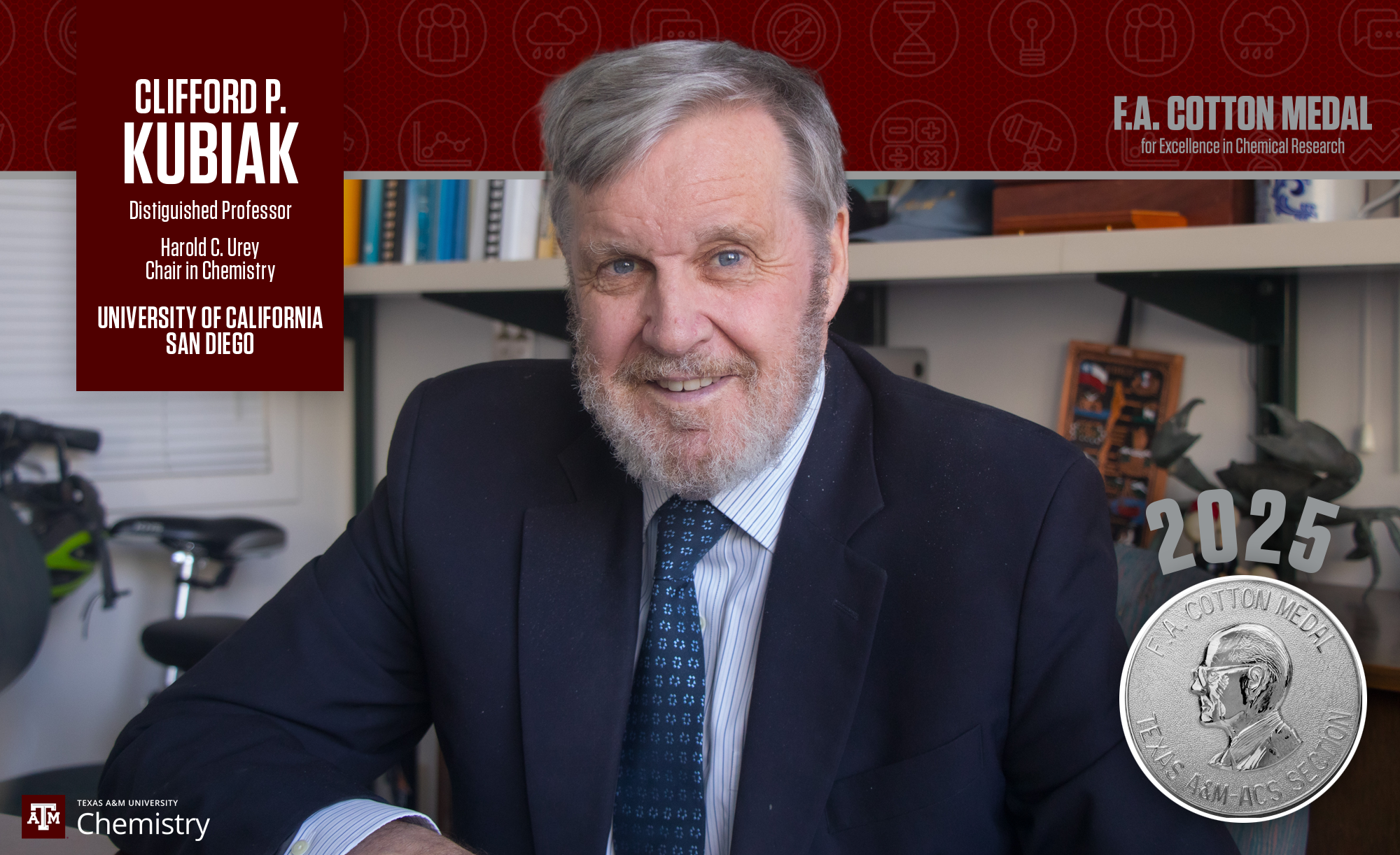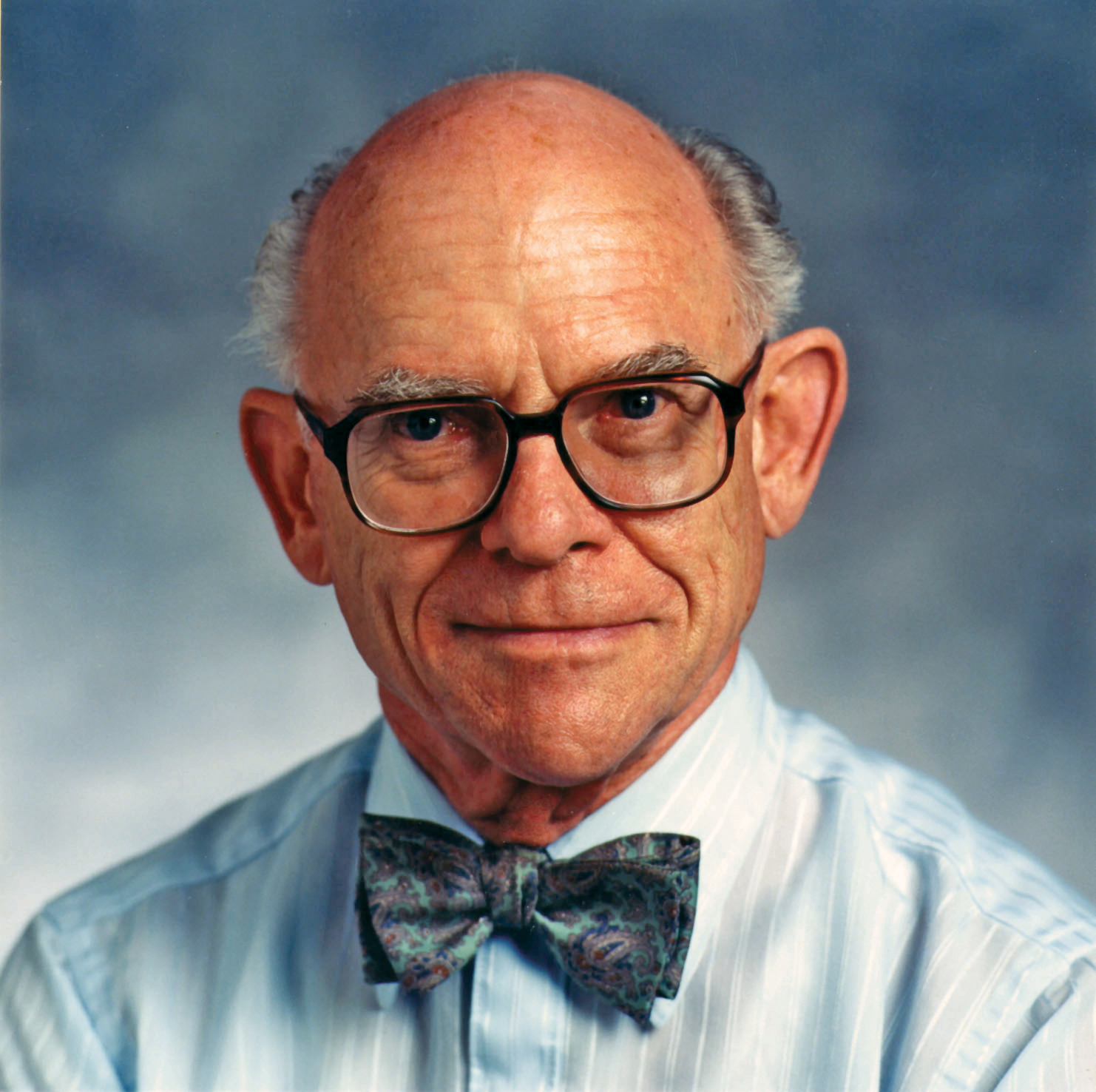
Clifford P. Kubiak, distinguished professor and the Harold C. Urey Chair in Chemistry at the University of California, San Diego, has been selected as the 2025 recipient of the F.A. Cotton Medal for Excellence in Chemical Research. The award honors the late Texas A&M chemist F. Albert Cotton and his pioneering career.
The medal is jointly awarded each year by the Texas A&M Department of Chemistry and the Texas A&M Section of the American Chemical Society (ACS) in tribute to Cotton, a Texas A&M distinguished professor of chemistry widely considered one of the world’s foremost inorganic chemists. He was the inaugural recipient of the medal when it was first awarded in 1995. Cotton, who died Feb. 20, 2007, joined Texas A&M in 1972 from MIT, where he had been the youngest faculty member to attain the rank of full professor. His 35-year career at Texas A&M revolutionized several fields of chemistry, particularly inorganic chemistry and metal-metal bonding.
Kubiak will be honored during an afternoon symposium set for Friday, April 11, 2025, at the Interdisciplinary Life Sciences Building (ILSB) Auditorium on the Texas A&M campus. His keynote presentation, titled "Catalysis of the Electrochemical Reduction of Carbon Dioxide to More Complex Products and Liquid Fuels," will take place at 4:30 p.m. Preceding talks will feature Dr. Charles Machan from the University of Virginia at 2 p.m. and Dr. Joshua Figueroa from UC San Diego at 3 p.m. The symposium will be followed by an invitation-only dinner, at which Kubiak will be presented with the Cotton Medal.

Kubiak was born in Stamford, Connecticut, and studied at Brown University, where he earned a Bachelor of Science in chemistry. He received his Ph.D. in chemistry from the University of Rochester under the mentorship of Rich Eisenberg. After a postdoctoral appointment at the Massachusetts Institute of Technology (1980-1981) with Mark Wrighton, he joined the faculty at Purdue University, where he served from 1982 to 1998. He then moved to UC San Diego, where he has spent the last 27 years.
His research spans inorganic chemistry, physical chemistry and nanomaterials. Since 1987, his group has investigated the chemistry, electrochemistry and photochemistry of carbon dioxide. His work on the catalytic reduction of carbon dioxide contributes to the growing field of solar fuels, which aims to develop light-harvesting materials and catalysts for converting carbon dioxide, water and sunlight into liquid fuels. His research focuses on understanding the mechanisms of electrocatalysts that facilitate electron transfer from an electrode to the carbon dioxide molecule for chemical reduction. These studies use various spectroscopy techniques to characterize the intermediates, products and local catalyst environments involved in catalysis.
Kubiak has led several large, multi-university projects on the electrochemical conversion of carbon dioxide to liquid fuels, funded by the Defense Advanced Research Projects Agency (DARPA), the Air Force Office of Scientific Research (AFOSR) and the National Science Foundation (NSF). He was a founding investigator and project leader of the Joint Center for Artificial Photosynthesis (JCAP), established by the U.S. Department of Energy in 2010 as the nation’s innovation hub for solar fuels research. JCAP continues today as the Liquid Sunlight Alliance (LiSA), a project that includes more than 100 faculty, research scientists, postdoctoral researchers and graduate students across five universities and three national laboratories.
Kubiak also has a long-standing interest in inorganic mixed valency, particularly in systems where intramolecular electron transfer occurs on an ultrafast (picosecond) timescale. This phenomenon causes the coalescence of infrared spectra in a manner similar to dynamic nuclear magnetic resonance but at a rate a billion times faster. He was one of the first inorganic chemists to work in molecular electronics, contributing to the first direct measurements of the electrical resistance of individual molecules using scanning tunneling microscopy.
Kubiak has published more than 300 articles on these and other topics and has supervised nearly 100 Ph.D. students and postdoctoral researchers. His honors include the American Chemical Society (ACS) Award in Organometallic Chemistry (2018), the ACS Award in Inorganic Chemistry (2012), the Tolman Medal (2018), the Fred Basolo Medal for Outstanding Research in Inorganic Chemistry (2015) and the Inter-American Photochemical Society Award in Photochemistry (2013). He was elected a fellow of the American Academy of Arts and Sciences in 2014 and the National Academy of Sciences in 2020.
For more information about the event, contact Texas A&M Chemistry at (979) 845-9829 or via email at chemhead@chem.tamu.edu.
